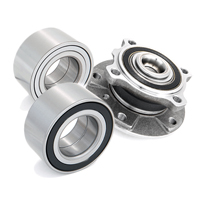Wheel bearing maintenance: the key to safe driving and cost savings
Wheel bearings are sets of steel balls or rollers in a metal ring. They are located in the wheel hub and ensure smooth rotation of the wheels with minimal friction. Wheel bearings are tremendously stressed by vehicle weight, acceleration, braking and cornering forces.
Signs of worn wheel bearings
- Grinding or humming noise: One of the most common signs of a failing wheel bearing is a grinding or humming noise that increases with speed. This noise is caused by the metal-to-metal contact in the bearing as it deteriorates.
- Vibrations in the steering wheel or chassis: Worn wheel bearings can cause noticeable vibrations in the steering wheel, floorboard or seat. These vibrations increase with speed and may indicate a serious safety problem.
- Wheel play: If you notice excessive play or looseness when you grab the top and bottom of your tire and shake it, it could be a sign of a worn wheel bearing.
- Uneven tire wear: A bad wheel bearing can cause uneven tire wear, leading to premature tire replacement and possible handling issues.
- ABS warning light: In some cases, the anti-lock braking system (ABS) warning light may come on due to a defective wheel bearing.
The importance of regular maintenance
Regular maintenance of wheel bearing as on the website of auto parts24.co.uk is essential for several reasons:
- Safety: Worn wheel bearings can cause wheel failure, resulting in loss of control and potentially serious accidents.
- Prevent costly repairs: Addressing wheel bearing problems early can prevent more expensive damage to the hub, axle and other suspension components.
- Improved fuel efficiency: Properly functioning wheel bearings reduce friction, which can lead to slightly lower fuel consumption.
- Smoother ride: healthy wheel bearings contribute to a smoother and quieter ride, improving your overall driving experience.
Maintaining your wheel bearings
- Regular inspections: Have your wheel bearings inspected by a qualified mechanic at least once a year or as recommended by the car manufacturer. They will check for signs of wear, damage or contamination.
- Lubrication: If your wheel bearings are not sealed, they may need regular lubrication. Consult your owner’s manual or a mechanic for recommended lubrication intervals and procedure.
- Quick repairs: If you notice signs of a bad wheel bearing, don’t wait too long and have it repaired or replaced by a professional. Ignoring the problem can worsen the damage and increase the risk of an accident.
Investing in your safety and savings
While wheel bearing maintenance may seem like an extra expense, it is a small investment compared to the potential cost of a major repair or accident. Regular maintenance will ensure long life and proper function of your wheel bearings, keeping you safe on the road and saving money in the long run.
Remember that your safety and the safety of others on the road depend on the reliability of your vehicle. Remember the importance of regular wheel bearing maintenance – it’s a small step that can have a big impact on your driving experience.

